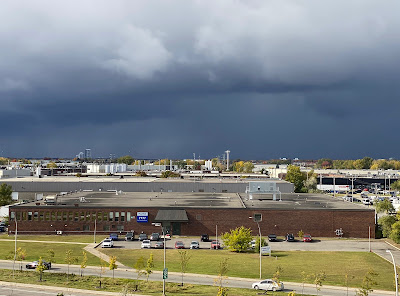 |
| Montreal is still waiting for our first measurable snowfall of the season, while the southern Prairies, including Regina shown above, have been plunged into mid-winter conditions, with heavy snow and frigid cold. (CBC SASKATCHEWAN) |
Montreal in on the verge of setting the record for the warmest meteorological fall on the record books. The current average temperature for the months of September, October and November combined, sits at 11C (52F), tied with the 2023 record and just 0.1C above the 2017 benchmark. You see the trend here, which has also pushed back the average arrival of the first 5cm snowfall in Montreal to the end of the month or even early December at best.
As a mater of fact, only a trace of snow has been observed in the city to date, with the average for November being 16cm. Many major US cities including Cleveland, Chicago and Detroit, as well as the Appalachian Mountains from Pennsylvania to North Carolina have measure snow before Montreal, Ottawa and Toronto.
The current complex storm system produced snow last evening across northern Ohio as well as western New York and the Adirondacks. Further north a soaking rain fell across parts of eastern Ontario, with just 7mm measured at my home on Ile Perrot. The bulk of the heaviest rain remained to the south and west of Montreal. Our monthly total sits at only 34.4mm, with officially 0cm of snow.
Meanwhile the coldest air with our current system also stayed west of Montreal, with temperatures across southwestern Quebec in the 5C to 7C (40 to 45F) range.
Friday morning an upper level low is drifting across central New York state, while surface low pressure develops along the east coast and drifts north into New England. The combination of both systems will keep damp, breezy and dreary weather in Montreal into the weekend, but no snow is expected for now. Temperatures are just too warm.
Looking ahead briefly into next week, colder air will try to make a run at eastern Canada, while a storm moves across the Ohio Valley. Chances for precipitation will increase again, with the potential for measurable snow in southern Quebec by the end of the week. For now we wait and see how cold our temperatures are.
If you want winter weather, head west. A strong storm system plowed into the BC coast this week, with heavy rain, snow and damaging winds gusting as high as 170km/h (105 mph) on the north coast of Vancouver Island. Meanwhile, 80km/h gusts occurred along the south coast. There was widespread power outages, structural damage, downed trees, with at least two fatalities in the Pacific Northwest.
Across the southern Prairies, a strong cold front ushered in mid-winter conditions, with the first snowstorm of the year on Tuesday, followed by arctic cold temperatures. Over 20cm of snow fell in Regina, with metre high drifts produced by 90km/h winds. More snow and cold is forecast this weekend and into next week. This morning while Montreal is 5C (41F), Saskatoon sits at -15C (5F).






































.png)
